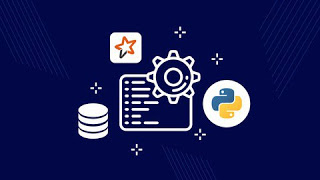 |
| Data Engineering Essentials - SQL, Python and Spark [Free Online Course] - PMtrk |
Build Data Engineering Pipelines using SQL, Python and Spark
This course includes:
- 38 hours on-demand video
- Full lifetime access
- Access on mobile and TV
- Certificate of completio
What you'll learn
- Setup Development Environment on GCP
- Database Essentials using Postgres
- Programming Essentials using Python
- Data Engineering using Spark Dataframe APIs
- Data Engineering using Spark SQL
Description
As part of this course, you will learn all the Data Engineering Essentials related to building Data Pipelines using SQL, Python as well as Spark.
About Data Engineering
Data Engineering is nothing but processing the data depending upon our downstream needs. We need to build different pipelines such as Batch Pipelines, Streaming Pipelines, etc as part of Data Engineering. All roles related to Data Processing are consolidated under Data Engineering. Conventionally, they are known as ETL Development, Data Warehouse Development, etc.
Course Details
As part of this course, you will be learning Data Engineering Essentials such as SQL, Programming using Python and Spark. Here is the detailed agenda for the course.
Database Essentials - SQL using Postgres
- Getting Started with Postgres
- Basic Database Operations (CRUD or Insert, Update, Delete)
- Writing Basic SQL Queries (Filtering, Joins, and Aggregations)
- Creating Tables and Indexes
- Partitioning Tables and Indexes
- Predefined Functions (String Manipulation, Date Manipulation, and other functions)
- Writing Advanced SQL Queries
Programming Essentials using Python
- Perform Database Operations
- Getting Started with Python
- Basic Programming Constructs
- Predefined Functions
- Overview of Collections - list and set
- Overview of Collections - dict and tuple
- Manipulating Collections using loops
- Understanding Map Reduce Libraries
- Overview of Pandas Libraries
- Database Programming - CRUD Operations
- Database Programming - Batch Operations
Setting up Single Node Cluster for Practice
- Setup Single Node Hadoop Cluster
- Setup Hive and Spark on Single Node Cluster
Introduction to Hadoop ecosystem
- Overview of HDFS Commands
Data Engineering using Spark SQL
- Getting Started with Spark SQL
- Basic Transformations
- Managing Tables - Basic DDL and DML
- Managing Tables - DML and Partitioning
- Overview of Spark SQL Functions
- Windowing Functions
Data Engineering using Spark Data Frame APIs
- Data Processing Overview
- Processing Column Data
- Basic Transformations - Filtering, Aggregations, and Sorting
- Joining Data Sets
- Windowing Functions - Aggregations, Ranking, and Analytic Functions
- Spark Metastore Databases and Tables
Desired Audience
Here is the desired audience for this course.
- College students and entry-level professionals to get hands-on expertise with respect to Data Engineering. This course will provide enough skills to face interviews for entry-level data engineers.
- Experienced application developers to gain expertise related to Data Engineering.
- Conventional Data Warehouse Developers, ETL Developers, Database Developers, PL/SQL Developers to gain enough skills to transition to be successful Data Engineers.
- Testers to improve their testing capabilities related to Data Engineering applications.
- Any other hands-on IT Professional who wants to get knowledge about Data Engineering with Hands-On Practice.
- Prerequisites
Logistics
- Computer with decent configuration (At least 4 GB RAM, however 8 GB is highly desired)
- Dual Core is required and Quad-Core is highly desired
- Chrome Browser
- High-Speed Internet
Desired Background
- Engineering or Science Degree
- Ability to use computer
- Knowledge or working experience with databases and any programming language is highly desired
Training Approach
Here are the details related to the training approach.
- It is self-paced with reference material, code snippets, and videos provided as part of Udemy.
- One can either use the environment provided by us or set up their own environment using Docker on AWS or GCP or the platform of their choice.
- We would recommend completing 2 modules every week by spending 4 to 5 hours per week.
- It is highly recommended to take care of the exercises at the end to ensure that you are able to meet all the key objectives for each module.
- Support will be provided either through Udemy Q&A.
Self Evaluation
The course is designed in such a way that one can self-evaluate through the course and confirm whether the skills are acquired.
Here is the approach we recommend you to take this course.
- The course is hands-on, you should practice as you go through the course.
- You should also spend time understanding the concepts. If you do not understand the concept, I would recommend moving on and come back later to the topic.
- Go through the consolidated exercises and see if you are able to solve the problems or not.
- Make sure to follow the order we have defined as part of the course.
- After each and every section or module, make sure to solve the exercises. We have provided enough information to validate the output.
By the end of the course, then you can come to the conclusion that you are able to master essential skills related to SQL, Python, and Spark.


0 Comments